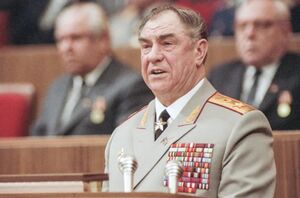Counter-Revolutionary Emergency Commission: Difference between revisions
No edit summary |
No edit summary |
||
| Line 88: | Line 88: | ||
}} | }} | ||
The '''Counter-Revolutionary Emergency Commission''' (Russian: Контрреволюционная Чрезвычайная Комиссия), abbreviated as '''KChK''' or '''CEC''', was a self-proclaimed political body in the [[Soviet Union (SovAm)|Soviet Union]] that existed from 2 April 1986 to 14 June 1994. It included multiple high-level Soviet officials from the Communist Party, KGB and the Soviet government who successfully won the Second Russian Civil War and carried out the assassination of Mikhail Gorbachev in 1987. The organization was disbanded after the end of the Civil War in 1994 and it's members were incorporated into Yanayev's Administration. | The '''Counter-Revolutionary Emergency Commission''' (Russian: Контрреволюционная Чрезвычайная Комиссия), abbreviated as '''KChK''' or '''CEC''', was a self-proclaimed political body in the [[Soviet Union (SovAm)|Soviet Union]] that existed from 2 April 1986 to 14 June 1994. It included multiple high-level Soviet officials from the Communist Party, KGB and the Soviet government who successfully won the [[Second Russian Civil War]] and carried out the [[assassination of Mikhail Gorbachev]] in 1987. The organization was disbanded after the end of the Civil War in 1994 and it's members were incorporated into Yanayev's Administration. | ||
The organization carried out multiple coups across various cities within the Soviet Union to maintain control just before the outbreak of the Civil War, including in Moscow and Leningrad. It eventually extended it's jurisdiction outside of it's occupied cities to become a main contender against the [[Gorbachev Administration]]. It is also debated that the actions of the CEC was the breaking point which started the Civil War. | |||
The organization recieved no diplomatic, military or economic support from any other nations, including [[Collective Security Treaty Organization|CSTO]] members. | |||
[[Category:SOVAM]] [[Category:Soviet Union (SovAm)]] [[Category:Factions of the Second Russian Civil War]] [[Category:Communist factions of the Second Russian Civil War]] | [[Category:SOVAM]] [[Category:Soviet Union (SovAm)]] [[Category:Factions of the Second Russian Civil War]] [[Category:Communist factions of the Second Russian Civil War]] | ||
Revision as of 20:27, 22 June 2024
This article is incomplete because it is pending further input from participants, or it is a work-in-progress by one author. Please comment on this article's talk page to share your input, comments and questions. Note: To contribute to this article, you may need to seek help from the author(s) of this page. |
Государственная Контрреволюционная Чрезвычайная Комиссия | |
 Dmitry Yazov directing a press conference with other members
of the CEC behind him in 1991 | |
| Abbreviation | CEC |
|---|---|
| Successor | Yanayev Administration |
| Formation | April 2, 1986 |
| Founder | Gennady Yanayev |
| Dissolved | June 14, 1994 |
| Type | Self-proclaimed provisional government |
| Legal status | Disbanded at the end of the Second Russian Civil War |
| Purpose | To prevent the total collapse of the Soviet Union, the prevention of Gorbachev's reforms and the removal of Gorbachev. |
| Headquarters | Kremlin |
Region | Soviet Union |
Membership (1994) | 21,000,000 |
Official language | Russian |
General Secretary | Gennady Yanayev |
The Counter-Revolutionary Emergency Commission (Russian: Контрреволюционная Чрезвычайная Комиссия), abbreviated as KChK or CEC, was a self-proclaimed political body in the Soviet Union that existed from 2 April 1986 to 14 June 1994. It included multiple high-level Soviet officials from the Communist Party, KGB and the Soviet government who successfully won the Second Russian Civil War and carried out the assassination of Mikhail Gorbachev in 1987. The organization was disbanded after the end of the Civil War in 1994 and it's members were incorporated into Yanayev's Administration.
The organization carried out multiple coups across various cities within the Soviet Union to maintain control just before the outbreak of the Civil War, including in Moscow and Leningrad. It eventually extended it's jurisdiction outside of it's occupied cities to become a main contender against the Gorbachev Administration. It is also debated that the actions of the CEC was the breaking point which started the Civil War.
The organization recieved no diplomatic, military or economic support from any other nations, including CSTO members.